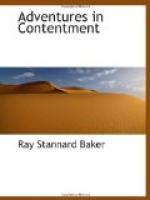The afternoon of my purchase was one of the great afternoons of my life. When Horace put me down at my gate, I did not go at once to the house; I did not wish, then, to talk with Harriet. The things I had with myself were too important. I skulked toward my barn, compelling myself to walk slowly until I reached the corner, where I broke into an eager run as though the old Nick himself were after me. Behind the barn I dropped down on the grass, panting with laughter, and not without some of the shame a man feels at being a boy. Close along the side of the barn, as I sat there in the cool of the shade, I could see a tangled mat of smartweed and catnip, and the boards of the barn, brown and weather-beaten, and the gables above with mud swallows’ nests, now deserted; and it struck me suddenly, as I observed these homely pleasant things:
“All this is mine.”
I sprang up and drew a long breath.
“Mine,” I said.
It came to me then like an inspiration that I might now go out and take formal possession of my farm. I might experience the emotion of a landowner. I might swell with dignity and importance—for once, at least.
So I started at the fence corner back of the barn and walked straight up through the pasture, keeping close to my boundaries, that I might not miss a single rod of my acres. And oh, it was a prime afternoon! The Lord made it! Sunshine—and autumn haze—and red trees—and yellow fields—and blue distances above the far-away town. And the air had a tang which got into a man’s blood and set him chanting all the poetry he ever knew.
“I climb that was a clod,
I run whose steps were slow,
I reap the very wheat of God
That once had none to sow!”
So I walked up the margin of my field looking broadly about me: and presently, I began to examine my fences—my fences—with a critical eye. I considered the quality of the soil, though in truth I was not much of a judge of such matters. I gloated over my plowed land, lying there open and passive in the sunshine. I said of this tree: “It is mine,” and of its companion beyond the fence: “It is my neighbour’s.” Deeply and sharply within myself I drew the line between meum and tuum: for only thus, by comparing ourselves with our neighbours, can we come to the true realisation of property. Occasionally I stopped to pick up a stone and cast it over the fence, thinking with some truculence that my neighbour would probably throw it back again. Never mind, I had it out of my field. Once, with eager surplusage of energy, I pulled down a dead and partly rotten oak stub, long an eye-sore, with an important feeling of proprietorship. I could do anything I liked. The farm was mine.




